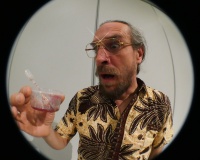Difference between revisions of "Micronoises - microqueering"
(→About the Mentor) |
(→About the Mentory) |
||
| Line 1: | Line 1: | ||
[[File:0-web-micronoises-2nd-august-poster.jpg|800px]] | [[File:0-web-micronoises-2nd-august-poster.jpg|800px]] | ||
| − | ==About the | + | ==About the Mentors== |
| − | === Paula Pin (ES) === | + | === Mentor: Paula Pin (ES) === |
Pin is a Transhackfeminist performer and researcher which has a strong inclination towards research and experimentation processes with collective and free technologies. | Pin is a Transhackfeminist performer and researcher which has a strong inclination towards research and experimentation processes with collective and free technologies. | ||
| Line 17: | Line 17: | ||
* http://paulapin.net/ | * http://paulapin.net/ | ||
* https://jellypin.hotglue.me/ | * https://jellypin.hotglue.me/ | ||
| + | |||
| + | === Assistant: Marc Dusseiller aka dusjagr (Coconut Island) === | ||
| + | |||
| + | {{:Marc Dusseiller bio}} | ||
| + | |||
| + | === Workshopologi Observer: Helmi Hardian (Indonesia) === | ||
| + | |||
| + | Helmi Hardian is a grassroots artist and ghetto scientist, with a specific interest in cooking and smoking at the same time. He lives in Surabaya, the city that is well known for its industry and technology, as well as being the center of electronic component trading (chiefly, Pasar Genteng). Hence, almost all of his works are closely related to science and technology as the medium of creativity. He is the co-founder of Waft Lab, a creative-based initiative that works at interdisciplinary practices. Currently, he focuses on tech development through DIY/DIWO culture and playing his role in researching, hacking, or deconstructing daily materials to provide some devices with new functional aspects, as well as developing workshop kits, lecturing contents, and presentation materials, which aim to learn, share, and exchange knowledge. | ||
Revision as of 15:06, 24 July 2023
Contents
About the Mentors
Mentor: Paula Pin (ES)
Pin is a Transhackfeminist performer and researcher which has a strong inclination towards research and experimentation processes with collective and free technologies. The experimental process of incorporating noise into the body leads to experiment with synthesizersoften including DIY DIWO Trans-tech body in performance. In 2011 carries out the process Photosinthetika, gender- tech-nature hybrid extension agencies to reappropriate knowledge of bio-political tactics and generate technological autonomy. Currently he dwells the transhackfeminist laboratory Petchblenda; The Lab experiments in bio-electro-chemical aspects with a Biopunk Biosophy, prolific research and bio-political practices.
My active participation in the lab Pechblenda and Transnoise, besides my social ideals and my workas a noise performance and workshopologist, has taken me to many spaces and contexts, specially to the point of starting to collaborate in 2012 with Hackteria, a Biohacking network. Open up again the opportunity to give up workshops as a facilitator all around the world always putting the focuson spread the knowledge and share experience over a transfeminism horizontal perspective.
The last year, after bio and transhackfeminist values I have been designing and fabricating the devices for a Mobile Lab developing a line of hardware (HardGlam) for Biotranslab project that is used for autonomous gynecology practices and investigation. As my knowledge in electronics is based on open source and DIY, the devices included in the laboratory are portable replications of a microscope, a speculum done with a 3D printer, an incubator, PCR, centrifuge ...
Plants, microorganisms and other sources of alternative energy, resulting in a complex web of interactions that fuses transversely machines and plant and animal organisms with the cosmos, and reveals a transhackfeminist queer ecology.
Assistant: Marc Dusseiller aka dusjagr (Coconut Island)
Marc Dusseiller, Center for Alternative Coconut Research & member of Hackteria
Dr. Marc R. Dusseiller is a transdisciplinary scholar, lecturer for micro- and nanotechnology, cultural facilitator and artist. He performs DIY (do-it-yourself) workshops in lo-fi electronics and synths, hardware hacking for citizen science and DIY microscopy. He also loves coconuts. He was co-organizing Dock18, Room for Mediacultures, diy* festival (Zürich, Switzerland), KIBLIX 2011 (Maribor, Slovenia), workshops for artists, schools and children as the former president (2008-12) of the Swiss Mechatronic Art Society, SGMK and co-founder of the new Hackerspace collective Bitwäscherei (2020) in Zürich. He has worked as guest faculty and mentor at various schools, Srishti Institute of Art, Design and Technology (IN), UCSB (USA) and in Switzerland, FHNW, HEAD, ETHZ. In collaboration with Kapelica Gallery, he has started the BioTehna Lab in Ljubljana (2012 - 2013), an open platform for interdisciplinary and artistic research on life sciences. Currently, he is developing means to perform bio- and nanotechnology research and dissemination, Hackteria | Open Source Biological Art, in a DIY / DIWO fashion in kitchens, ateliers and in the Majority World. He was the co-organizer of the different editions of HackteriaLab 2010 - 2020 Zürich, Romainmotier, Bangalore, Yogyakarta and Klöntal, Okinawa and collaborated on the organisation of the BioFabbing Convergence, 2017, in Geneva and the Gathering for Open Science Hardware, GOSH! 2016, Geneva & 2018, in Shenzhen.
- http://hackteria.org
- http://www.mechatronicart.ch
- http://openhardware.science
- https://www.bitwaescherei.ch/
- http://www.randelab.ch
Workshopologi Observer: Helmi Hardian (Indonesia)
Helmi Hardian is a grassroots artist and ghetto scientist, with a specific interest in cooking and smoking at the same time. He lives in Surabaya, the city that is well known for its industry and technology, as well as being the center of electronic component trading (chiefly, Pasar Genteng). Hence, almost all of his works are closely related to science and technology as the medium of creativity. He is the co-founder of Waft Lab, a creative-based initiative that works at interdisciplinary practices. Currently, he focuses on tech development through DIY/DIWO culture and playing his role in researching, hacking, or deconstructing daily materials to provide some devices with new functional aspects, as well as developing workshop kits, lecturing contents, and presentation materials, which aim to learn, share, and exchange knowledge.

